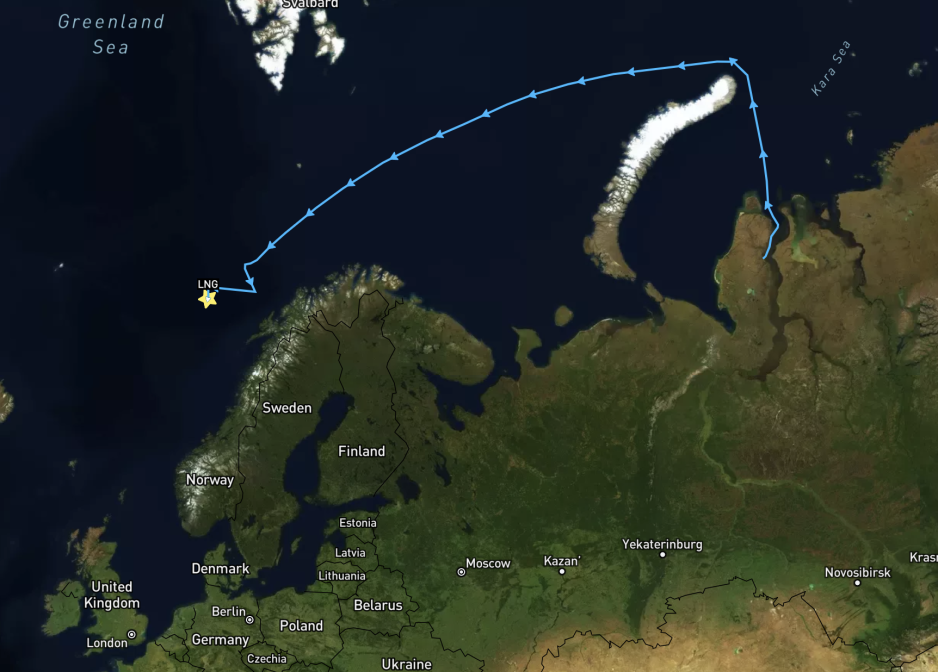 [[{“value”:”
[[{“value”:”
Germany’s Ministry of the Economy instructed a state-owned LNG terminal operator to reject a shipment of Russian Arctic liquefied natural gas. The decision affirms the country’s position to not directly import Russian gas via pipeline or as LNG. But German imports of the country’s gas continue indirectly via the continent’s gas network.
The political puzzle surrounding the EU’s continued imports of Russian liquefied natural gas (LNG) from the Arctic received another piece this week.
Germany’s economy ministry instructed a state-operated LNG import facility in Brunsbüttel to reject a shipment of Yamal LNG.
The vessel in question is likely the ice-capable Arc7 carrier Fedor Litke, which was traveling down Norway’s coastline on November 14 when the German “Nein” was handed down by its government.
“Overriding public interests”
According to reporting by the Financial Times, in a letter the ministry ordered the terminal operator Deutsche Energy Terminal, “not to accept any deliveries of Russian LNG.” The delivery in question had been set to arrive at Brunsbüttel on Sunday.
The German government cited “overriding public interests” in its decision to reject deliveries of Russian LNG.
The EU earlier this year put in place a mechanism allowing member states to reject booking slots at LNG terminals to vessels carrying Russian gas, primarily from the Arctic.
The measure was meant to provide a legal basis to refuse imports of LNG from the country on an ad hoc and individual country basis. Though it is unclear if the German authorities cited the EU regulation in their decision.

Fedor Litke’s AIS track showing departure from Yamal LNG and abrupt course changes off Norway’s coast on November 14. (Source: Shipatlas)
Indirectly Russian gas still flows
The events offer an opportunity to publicly restate Germany’s policy of not directly importing gas from the country, just weeks from the impending early federal elections.
Much less publicly known, however, is the continued import by German state energy firm Sefe of Arctic Russian LNG under long-term contracts and landing it at a French facility in Dunkirk.
From here the LNG is regasified and transported throughout Europe, including to Germany, via the continent’s interconnected gas pipeline network. Data show that this Russian LNG has been flowing to Germany from France since October 2022.
“The fact is that Russian natural gas and LNG still account for a significant percentage of European supply (15-20% of gas including pipeline supply and LNG) so like it or not, anyone pulling natural gas from the European pipeline grid is buying Russian gas,” highlights Jason Feer, global head of business intelligence at Poten & Partners, a global ship brokerage and business intelligence advisor.
But of course optics matter, especially 3 months from an election.
Russian LNG may not be critical to European natural gas supply
“I guess it’s one thing to end up with some Russian gas in your pipeline supply, but another to actually unload a shipment of Russian LNG from a Russian vessel into a German terminal,” Feer points out.
Efforts may pick up speed in 2025
Discussions in Brussels to move toward a reduction of inflow of Russian LNG into the continent may pick up speed in the coming weeks as the Hungarian EU presidency winds down and Poland takes up the revolving position.
In a message on the platform X, formerly Twitter, Poland’s Permanent Representation to the EU stated that “[the EU] needs to further decrease the import of Russian gas and we need solutions that work,” foreshadowing greater efforts on the matter in 2025.
Little progress was made on the 15th and 16th EU sanctions package during the second half of 2024 during the Hungarian leadership, but the pace will pick up, several persons familiar with the dialogue in Brussels told HNN.
An improving supply situation on the LNG market at large may also improve EU member states’ appetite to phase out Russian LNG without affecting supply security and energy prices for already battered European consumers.
“Over the next year or two, we will start to see significant new LNG supply from the US and Qatar and that means that Russian LNG may not be critical to European natural gas supply,” concludes Feer.
We give you energy news and help invest in energy projects too, click here to learn more
The post Germany Rejects Vessel Carrying Russian Arctic LNG, But Continues Indirect Imports Via EU Neighbors appeared first on Energy News Beat.
“}]]
